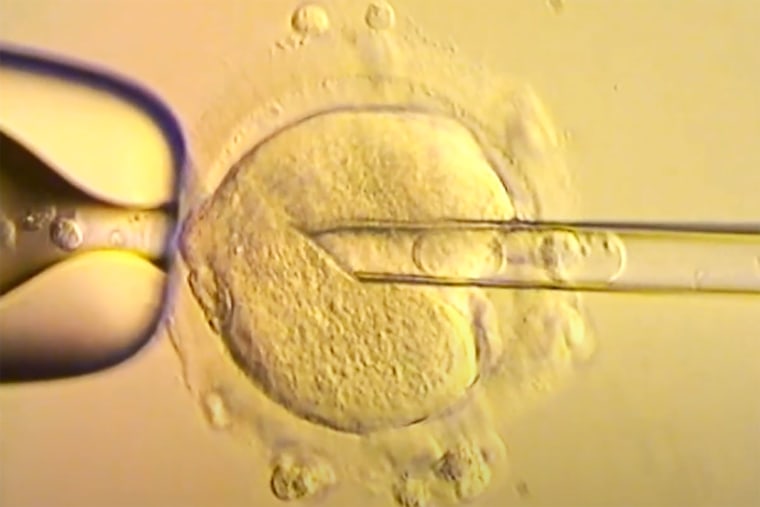
Health officials at Sarasota County Mosquito Management Services study specimens of anopheles mosquitoes that cause malaria, in Sarasota, Fla. on June 30, 2023. The U.S. Centers for Disease Control and Prevention issued an alert after five cases of malaria were confirmed, the first locally acquired cases of the disease in the United States in 20 years.
Chandan Khanna/AFP via Getty Images
hide caption
toggle caption
Chandan Khanna/AFP via Getty Images

Health officials at Sarasota County Mosquito Management Services study specimens of anopheles mosquitoes that cause malaria, in Sarasota, Fla. on June 30, 2023. The U.S. Centers for Disease Control and Prevention issued an alert after five cases of malaria were confirmed, the first locally acquired cases of the disease in the United States in 20 years.
Chandan Khanna/AFP via Getty Images
MIAMI — In the timeless battle between humans and mosquitoes, the insects have had the upper hand. Every year, at least 700,000 people die from mosquito-borne diseases such as malaria, dengue, West Nile, and yellow fever. Global trade and climate change have facilitated the spread of disease-carrying species to areas like Florida, California, and Texas. In some parts of the U.S., dengue has become a persistent issue. Last year, Florida and Texas reported locally-acquired malaria cases for the first time in decades, and Maryland also had a case. However, scientists have developed bioengineering tools that they believe could help manage and potentially eliminate mosquitoes that carry diseases like dengue and malaria. Andrea Leal, the head of mosquito control in the Florida Keys, says, “The good news is we’ve got these emerging technologies that show great promise in reducing Aedes aegypti mosquitoes.”

The Aedes aegypti mosquito, known for its preference to feed on humans, has become a significant health concern across the southern U.S. Leal’s agency was the first in the country to collaborate with Oxitec, a company testing a new approach to mosquito control. Oxitec has used gene editing to develop male mosquitoes that, when they reproduce, produce female offspring that do not survive to adulthood. Females are the ones that bite and spread diseases like dengue. Over the past three years, Oxitec has released a limited number of its bioengineered male mosquitoes in the Florida Keys. The company has not disclosed the results of those trials yet, but a study in Brazil in 2022 showed that the technology reduced mosquito populations by over 90% in some areas. Brazil has approved Oxitec’s request to commercially market it.

Oxitec workers canvass a neighborhood to speak about the genetically-engineered Aedes aegypti mosquitoes being released on June 09, 2021 in Marathon, Fla. Florida Keys Mosquito Control District and Oxitec began the first-ever U.S. release of genetically engineered Aedes aegypti mosquitoes to control the species that can carry dengue, Zika, and yellow fever.
Joe Raedle/Getty Images
hide caption
toggle caption
Joe Raedle/Getty Images

Oxitec workers canvass a neighborhood to speak about the genetically-engineered Aedes aegypti mosquitoes being released on June 09, 2021 in Marathon, Fla. Florida Keys Mosquito Control District and Oxitec began the first-ever U.S. release of genetically engineered Aedes aegypti mosquitoes to control the species that can carry dengue, Zika, and yellow fever.
Joe Raedle/Getty Images
The company’s CEO, Grey Frandsen, states, “Now the product is being deployed in every state in Brazil, including in the heart of the Amazon where the Amazon tourism authority has selected Oxitec to deploy around tourism sites because they are, in essence, rejecting the need to deploy chemical pesticides.” Similarly, many research organizations are focusing on using gene editing to combat mosquitoes. An advantage of this method is its applicability to any species, including those that transmit malaria. Oxitec is working with three species of malaria mosquitoes and is discussing conducting trials in Uganda.
Eric Caragata, an entomologist at the University of Florida, believes that there is growing evidence that gene editing technology will be a significant tool in reducing the spread of dengue, malaria, and other diseases. “If you use a product like that,” he states, “you have the potential to drastically reduce the number of mosquitoes in an area, hopefully accompanied by a decrease in the number of cases.” Moreover, at the University of California San Diego, Omar Akbari is using gene editing to target a mosquito species that carries malaria. He calls gene editing a “game changer” and believes that if it is scaled up and maintained, it can eliminate the Aedes aegypti mosquito from North America. “I think it’s going to be difficult but I don’t think it’s impossible,” he suggests, “because they have been eradicated before using insecticides. And these are new technologies.”

In the U.S. and elsewhere, there has been public resistance and concerns about the potential environmental impact of releasing bioengineered mosquitoes. The three years of trials in the Keys were conducted to demonstrate to state and federal regulators that the technology is both safe and effective for the environment. In recent years, Frandsen has observed a shift in the questions his staff receives from the public. He explains, “The question is no longer ‘Do these technologies have a role?’ ‘Are these technologies appropriate for communities?'” Instead, the questions now are about how quickly these technologies can be introduced to new communities in need. Oxitec hopes to obtain approval from the U.S. Environmental Protection Agency and make its mosquito control technology commercially available in the U.S. within the next two years.












